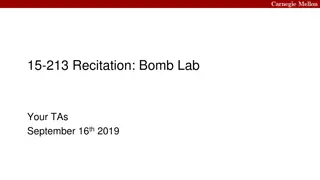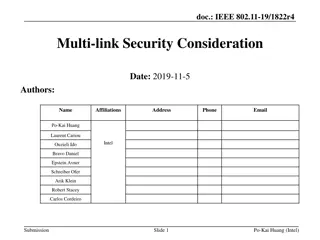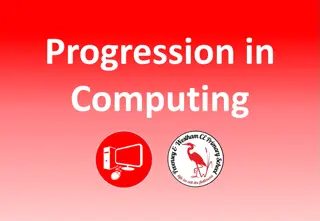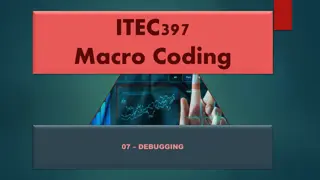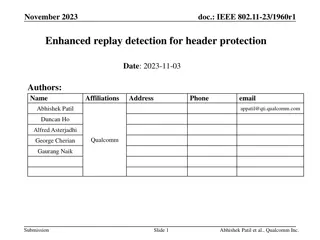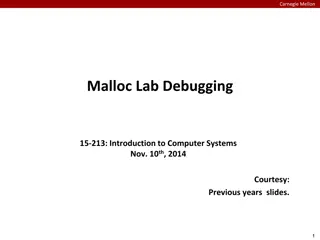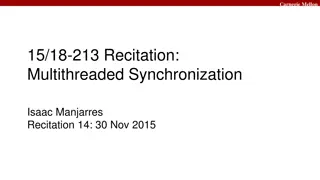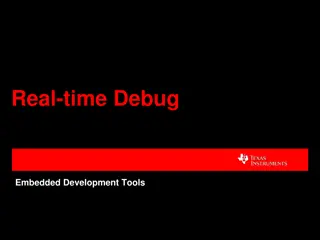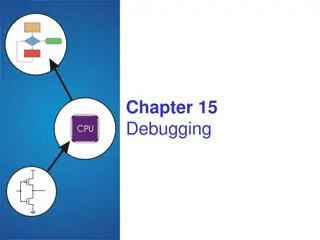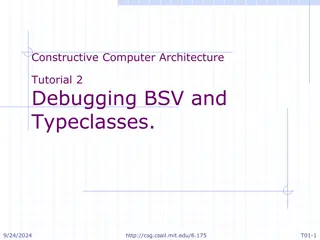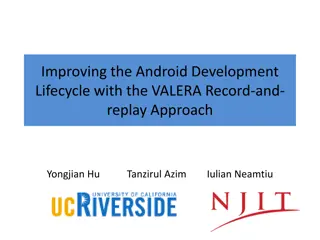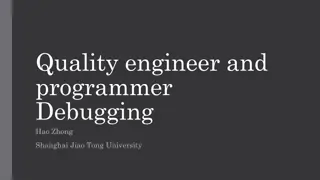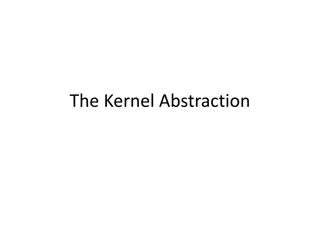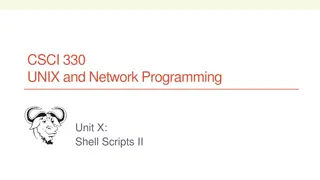Enhancing Replay Interface Efficiency in System Debugging
Efforts by researchers at Microsoft Research Asia and MIT focus on enhancing replay interface efficiency for system debugging. The motivation stems from the non-determinism challenges caused by time, user input, network I/O, and thread interleaving. The study observes that only certain parts of a program need to be replayed, posing unique challenges in finding a complete replay interface with low recording overhead. The execution flow graph illustrates deterministic and non-deterministic behaviours during replay. By addressing these challenges, the research aims to improve postmortem debugging and system reliability.
Download Presentation

Please find below an Image/Link to download the presentation.
The content on the website is provided AS IS for your information and personal use only. It may not be sold, licensed, or shared on other websites without obtaining consent from the author.If you encounter any issues during the download, it is possible that the publisher has removed the file from their server.
You are allowed to download the files provided on this website for personal or commercial use, subject to the condition that they are used lawfully. All files are the property of their respective owners.
The content on the website is provided AS IS for your information and personal use only. It may not be sold, licensed, or shared on other websites without obtaining consent from the author.
E N D
Presentation Transcript
Microsoft Research Asia Ming Wu, Haoxiang Lin, Xuezheng Liu, Zhenyu Guo, Huayang Guo, Lidong Zhou, Zheng Zhang MIT Fan Long, Xi Wang, Zhilei Xu
Outline Motivation Observation Challenges Modeling Replay Interface Generating Replay Interface Record and Replay Evaluation Conclusion
Motivation Replay is important due to non-determinism Caused by time, user input, network I/O, thread interleaving Makes postmortem debug hard Existing replay tools Incurs significant overhead: interposition & logging Hard to be adopted, especially for deployed system How to mitigate recording overhead? Using efficient way to find the necessary information to log
Observation Replay interface between program and environment Only part of the program needs to be replayed struct ne_request { ne_status status; char respbuf[]; }; status->code neon s routine req->respbuf int read_status_line( ne_request *req, ne_status *status, ...) { ne_sock_readline( , req->respbuf, ); if (...) status->code = atoi(buffer + 4); else if (ne_parse_statusline(buffer, status)) {...} } return value recv 4B 1MB *respbuf (1MB) atoi
Challenges Finding a complete replay interface Finding a replay interface incurring low recording overhead
Outline Motivation Observation Challenges Modeling Replay Interface Generating Replay Interface Record and Replay Evaluation Conclusion
Execution Flow Graph(EFG) f() { cnt = 0; g(&cnt); printf("%d\n", cnt); g(&cnt); printf("%d\n", cnt); } g(int *p) { a = random(); *p += a; } replay target cnt1 Inst1 a1 Inst2 deterministic Inst3 Cut 1 cnt2 Inst4 // execution 1 cnt1 <- 0 2 a1 <- random() 3 cnt2 <- cnt1 + a1 4 print cnt2 5 a2 <- random() 6 cnt3 <- cnt2 + a2 7 print cnt3 Cut 2 non-deterministic a2 Inst5 Inst6 cnt3 Inst7
Outline Motivation Observation Challenges Modeling Replay Interface Generating Replay Interface Record and Replay Evaluation Conclusion
Static Flow Graph Replay interface on EFG only optimal for specific run Sound approximation of execution flow graph cnt g f a Scan whole program Operation node for function, value node for variable Interpret instruction as read/write y = x + 1 read x and write y Alias analysis
Functions without Source Code Conservatively consider them as non-deterministic by default recv(fd, buf, len, flags) Annotate functions to provide write edge recv([in]fd, [out, bsize(return)] buf, [in]len, [in]flags) Annotate functions as deterministic Math functions: abs(), sqrt() Memory and string: memcpy(), strcat()
Outline Motivation Observation Challenges Modeling Replay Interface Generating Replay Interface Record and Replay Evaluation Conclusion
Replay Runtime Calls Record call from function in non-replay space to function which may be in replay space Replay callee if it does belong to replay space Writes Where to issue writes Replayed When to issue writes f i x Downcall Upcall g h Non-replayed
Other Subtle Non-determinisms Memory Management Address of variables in replay space should not change Separated deterministic memory pool for replay space Separate stacks for replay and non-replay functions Thread Interleaving Synchronization log Deterministic multi-threading
Evaluation Implemented iTarget for C program on Windows Using Phoenix compiler framework for instrumentation Benchmarks: Apache HTTP Server, Berkeley DB, neon HTTP client, wget, SPEC CINT2000 Modular and monolithic programs Compared to R2 (OSDI 2008)
Apache HTTP server less than 1% slowdown
Conclusion A model Reduce the problem of finding an optimal replay interface to that of finding the minimum cut in a data flow graph A system: iTarget employ programming language techniques to achieve both correctness and low recording overhead
Profiling Results tend not to be sensitive to the profiling workload scale
Related Work Library-based replay tools: RecPlay (TOCS 1999) Flashback (USENIX ATC 2004) Liblog (USENIX ATC 2006) R2 (OSDI 2008) Instruction level replay iDNA (VEE 2006) Other language runtime Java, ML, MPI
Memory Management Address of variables in replay space should not change Variables allocated in heap Non-replay space function may allocate memory Separate deterministic memory pool for replay space Variables allocated on stack Record ESP at a call from non-replay to replay space Reset the ESP during replay lower address i i ESP Recorded ESP h Run- time g f f higher address Recording stack Replay stack
Memory Management Address of variables in replay space should not change Variables allocated in heap Non-replay space function may allocate memory Separate deterministic memory pool for replay space Variables allocated on stack Current ESP Record ESP at a call from non-replay to replay space Reset the ESP during replay lower address i i ESP Recorded ESP h Run- time g f f higher address Recording stack Replay stack
Monolithic Program Neon and Wget
Functions without Source Code Conservatively consider them as non-deterministic by default recv(fd, buf, len, flags) System global variable: errno Annotate functions to provide write edge recv([in]fd, [out, bsize(return)] buf, [in]len, [in]flags) Annotate functions as deterministic Math functions: abs(), sqrt() Memory and string: memcpy(), strcat()
Memory Management Address of variables in replay space should not change Variables allocated in heap Non-replay space function may allocate memory Separate deterministic memory pool for replay space Variables allocated on stack Record ESP at a call from non-replay to replay space Reset the ESP during replay
Thread Management Thread interleaving introduce another source of non- determinism Guarantee same write order during replay as recording run Synchronization log Track causal dependency Utilize deterministic multi-threading model
Execution Flow Graph(EFG) f() { cnt = 0; g(&cnt); printf("%d\n", cnt); g(&cnt); printf("%d\n", cnt); } g(int *p) { a = random(); *p += a; } cnt1 g1 a1 Cut 2 f cnt2 // execution 1 cnt1 <- 0 2 a1 <- random() 3 cnt2 <- cnt1 + a1 4 print cnt2 5 a2 <- random() 6 cnt3 <- cnt2 + a2 7 print cnt3 g2 a2 cnt3










